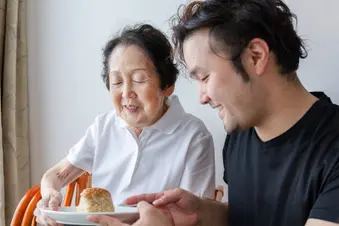
You might take care of a loved one in your home or theirs. Whether you do it full time or just help out once in a while, consider these things when caring for an older adult.
Plan Ahead
Talk to your loved one about what kind of help they think they need and how they’d like to get it. It can be hard sometimes to plan ahead, because you don’t know how needs will change. But come up with a road map for care.
Get your loved one’s doctor involved. Make sure you know all their health problems and what level of care they might require.
Ask these questions: Is your loved one able to stay at home alone with help from time to time? Or would it be better for them to move in with you or into a facility? Make a care plan to chart what kind of help they need.
Types of Care
You might have to provide different kinds of support depending on your loved one’s needs:
Personal care: They might need help with bathing, dressing, grooming, and other personal care. This could include helping them get to the bathroom and cleaning themselves after. For aging parents, it’s a role reversal because they’re used to taking care of their kids. If either of you is uncomfortable with bathing or toilet care, you may want to hire a home health aide.
Household help: They might need help with cleaning, laundry, and yard work. Food also can be a key part of caregiving. Your loved one could need help grocery shopping and preparing healthy meals. You can cook for them or have some meals delivered. Taking your loved one out to eat or bringing them to your home gives them a chance to be social and visit with other people.
Emotional support: Your loved one might need you to spend time with them, just talking and offering emotional support. They could come to rely on you for regular visits to keep them company, so they don’t get lonely. Sometimes older people can easily forget things or get grumpy. Be calm and patient with them when you’re together.
Health care: You might need to help with their medical needs, like making sure they take medicines or going with them to doctor’s appointments. To make it easier, you can prepare pillboxes that have each day’s pills ready for a whole week. It helps to go to doctor visits to ask questions and take notes.
Understand Health Issues
There’s a chance your loved one will have some health concerns. Older people often have issues like heart disease, Alzheimer’s, and depression.
It’s important that you learn about any health problems, so you know what to look out for. You’ll be able to spot symptoms if things get worse. You’ll also be better prepared at doctor visits to give updates on their health.
Make the Home Safe
Whether your loved one is staying in their home or yours, make safety a priority. Take steps to reduce their risk of falling, and other basic safety measures like these:
- Remove throw rugs.
- Place non-skid strips on hardwood and tile floors.
- Add safety rails in showers and tubs and near the toilet.
- Reduce water temperature to below 120 F (48.9 C).
- Move furniture and clear clutter to create clear, wide paths.
- Place nightlights throughout the home.
- Cover stairs with non-skid strips or carpet, and install nightlights at the top and bottom.
Know That Plans Can Change
You have a care plan today that’s working well. But your loved one’s needs can change.
Keep track of how things are going to make sure your plan still meets their needs. You may find you can’t provide enough medical care or aren’t able to be around all the time the way your loved one needs.
And if you're injured or come down with an illness like COVID-19 yourself, you’ll need to have a backup plan in place. Choose someone who can take care of your loved one if you can’t. Don't risk spreading the illness to them.
At that time, you’ll need to have a talk with them and their doctor about better options. It’s important to communicate and always take stock of the relationship to make sure you’re doing what’s best for everyone.
Take Care of Yourself
When you’re caring for someone else, it’s often hard to focus on your own needs. You may even feel guilty when you do. But taking care of yourself will help you be more focused and do a better job for your loved one. There are a few things you can do to stay on top of your game:
- Make time for sleep. A daily routine can help teach your body and mind it’s time for sleep.
- Try a mindfulness practice. Yoga or tai chi help you relax.
- Don’t forget to eat. Skipping meals can make you irritable and tired. Get plenty of healthy food and cut back on alcohol.
- Stay connected. Friends and family can help you feel less alone.If you need more structured support, check with local hospitals or organizations for your loved one’s conditions.
Show Sources
Photo Credit: SetsukoN / Getty Images
SOURCES:
National Institute on Aging: “Aging in Place: Growing Older at Home.”
Family Caregiver Alliance: “Hiring In-Home Help,” “ ‘Parenting’ Your Elderly Parents.”
Aging in Place: “Caregiver Responsibilities List: Caring For My Parents,” “Home Care For The Elderly In Their Own Homes: Important Things To Remember.”
Ameritech College of Healthcare: “Understanding How to Provide Care to Elderly Patients.”
SeniorLiving.org: “Tips for Caregivers of Elderly Loved Ones.”
Mayo Clinic: “Home safety tips: Preparing for Alzheimer's caregiving.”
AARP: “How to Make a Home Safe for Your Aging Parent.”
Aging.com: “What is a Caregiver and How Can They Help You or a Loved One?"
Johns Hopkins Medicine: “Coronavirus and COVID-19: Caregiving for the Elderly.”